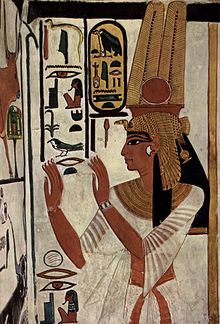Nefertari
| Nefertari-Meritmut in hieroglyphs | |||||||
|---|---|---|---|---|---|---|---|
Nefertari Meritmut Nfrt jrj mrjt n Mwt Beautiful companion, beloved of Mut |
|||||||
| Nefertari | |||||
|---|---|---|---|---|---|
| Queen consort of Egypt Great Royal Wife Lady of The Two Lands Mistress of Upper and Lower Egypt, etc |
|||||

Tomb wall depicting Queen Nefertari, the great royal wife of Pharaoh Rameses II
|
|||||
| Died | ca. 1255 BC | ||||
| Burial | QV66, Valley of the Queens, Thebes | ||||
| Spouse | Ramesses II | ||||
| Issue |
Amun-her-khepeshef Pareherwenemef Meryatum Meryre Meritamen Henuttawy Baketmut (possibly) Nefertari (possibly) Nebettawy (possibly) |
||||
|
|||||
| Dynasty | 19th of Egypt | ||||
| Religion | Ancient Egyptian religion | ||||
| Full name | |
|---|---|
| Nefertari Meritmut |
Nefertari, also known as Nefertari Meritmut, was an Egyptian queen and the first of the Great Royal Wives (or principal wives) of Ramesses the Great. Nefertari means 'beautiful companion' and Meritmut means 'Beloved of [the goddess] Mut'. She is one of the best known Egyptian queens, next to Cleopatra, Nefertiti and Hatshepsut. She was highly educated and able to both read and write hieroglyphs, a very rare skill at the time. She used these skills in her diplomatic work, corresponding with other prominent royalties of the time. Her lavishly decorated tomb, QV66, is one of the largest and most spectacular in the Valley of the Queens. Ramesses also constructed a temple for her at Abu Simbel next to his colossal monument there.
Nefertari held many different titles, including: Great of Praises (wrt-hzwt), Sweet of Love (bnrt-mrwt), Lady of Grace (nbt-im3t), Great King’s Wife (hmt-niswt-wrt), Great King’s Wife, his beloved (hmt-niswt-wrt meryt.f), Lady of The Two Lands (nbt-t3wy), Lady of all Lands (hnwt-t3w-nbw), Wife of the Strong Bull (hmt-k3-nxt), god’s Wife (hmt-ntr), Mistress of Upper and Lower Egypt (hnwt-Shm’w-mhw). Ramesses II also named her 'The one for whom the sun shines'.
Although Nefertari's family background is unknown, the discovery in her tomb of a knob inscribed with the cartouche of Pharaoh Ay has led people to speculate she was related to him. The time between the reign of Ay and Ramesses II means that Nefertari could not be a daughter of Ay and if any relation exists at all, she would be a great-granddaughter. There is no conclusive evidence linking Nefertari to the royal family of the 18th dynasty however. Nefertari married Ramesses II before he ascended the throne. Nefertari had at least four sons and two daughters. Amun-her-khepeshef, the eldest was Crown Prince and Commander of the Troops, and Pareherwenemef would later serve in Ramesses II’s army. Prince Meryatum was elevated to the position of High Priest of Re in Heliopolis. Inscriptions mention he was a son of Nefertari. Prince Meryre is a fourth son mentioned on the façade of the small temple at Abu Simbel and is thought to be another son of Nefertari. Meritamen and Henuttawy are two royal daughters depicted on the façade of the small temple at Abu Simbel and are thought to be daughters of Nefertari.
...
Wikipedia
